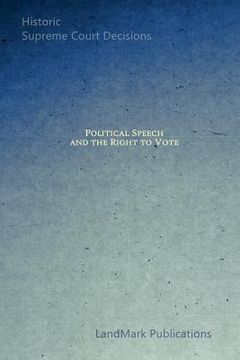Synopsis "Political Speech and the Right to Vote"
This CASEBOOK contains a selection of U. S. Supreme Court decisions that discuss and interpret issues stemming from the right to vote and political speech doctrine. Representative democracy in any populous unit of governance is unimaginable without the ability of citizens to band together in promoting among the electorate candidates who espouse their political views. The formation of national political parties was almost concurrent with the formation of the Republic itself. See Cunningham, The Jeffersonian Republican Party, in 1 History of U. S. Political Parties 239, 241 (A. Schlesinger ed. 1973). Consistent with this tradition, the Court has recognized that the First Amendment protects "the freedom to join together in furtherance of common political beliefs," Tashjian, supra, at 214-215, which "necessarily presupposes the freedom to identify the people who constitute the association, and to limit the association to those people only," La Follette, 450 U. S., at 122. That is to say, a corollary of the right to associate is the right not to associate. "'Freedom of association would prove an empty guarantee if associations could not limit control over their decisions to those who share the interests and persuasions that underlie the association's being.' " Id., at 122, n. 22 (quoting L. Tribe, American Constitutional Law 791 (1978)). See also Roberts v. United States Jaycees, 468 U. S. 609, 623 (1984). The Supreme Court has recognized that States have a major role to play in structuring and monitoring the election process, including primaries. See Burdick v. Takushi, 504 U. S. 428, 433 (1992); Tashjian v. Republican Party of Conn., 479 U. S. 208, 217 (1986). [The Court has] considered it "too plain for argument," for example, that a State may require parties to use the primary format for selecting their nominees, in order to assure that intraparty competition is resolved in a democratic fashion. American Party of Tex. v. White, 415 U. S. 767, 781 (1974); see also Tashjian, supra, at 237 (Scalia, J., dissenting). Similarly, in order to avoid burdening the general election ballot with frivolous candidacies, a State may require parties to demonstrate "a significant modicum of support" before allowing their candidates a place on that ballot. See Jenness v. Fortson, 403 U. S. 431, 442 (1971). Finally, in order to prevent "party raiding"-a process in which dedicated members of one party formally switch to another party to alter the outcome of that party's primary-a State may require party registration a reasonable period of time before a primary election. See Rosario v. Rockefeller, 410 U. S. 752 (1973). Cf. Kusper v. Pontikes, 414 U. S. 51 (1973) (23-month waiting period unreasonable).

